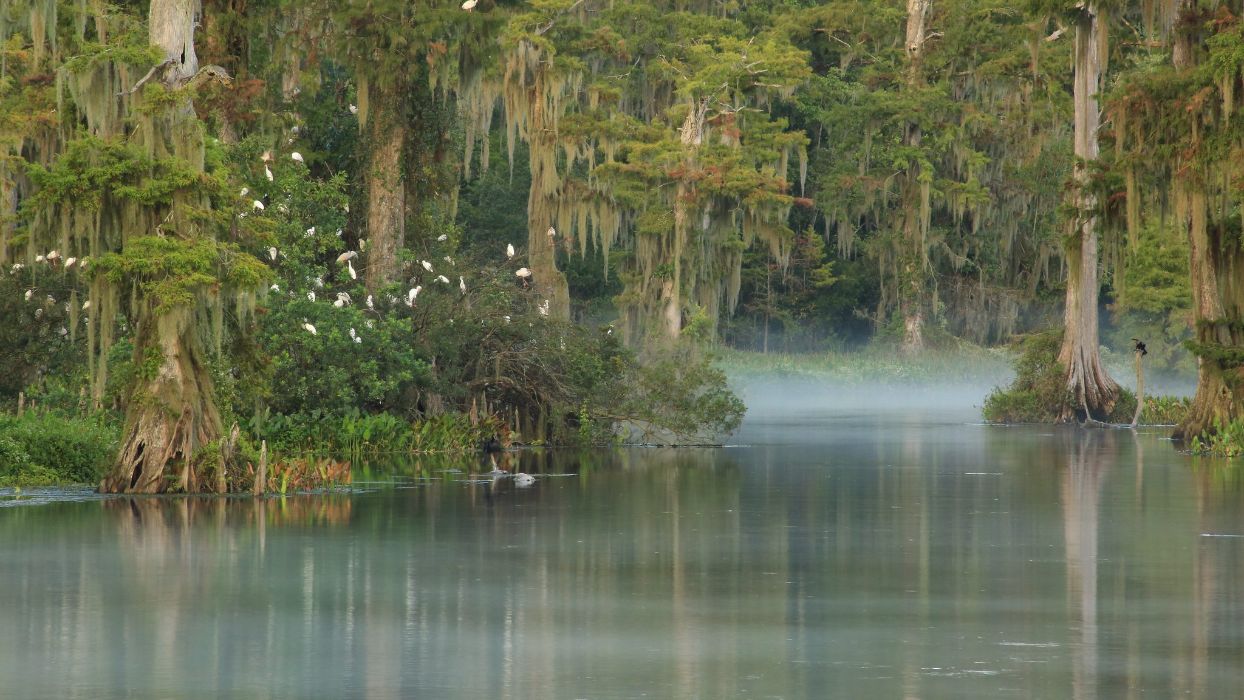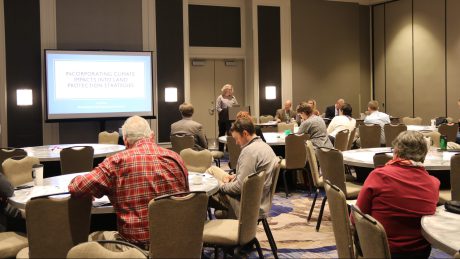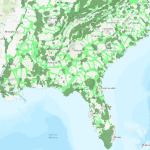November 2019 Newsletter

November 2019 Newsletter
Welcome to the Southeast Climate Adaptation Science Center’s November 2019 Newsletter.
For news and upcoming events related to the Southeast Climate Adaptation Science Center, subscribe to our monthly newsletter.

Southeast Climate Adaptation Science Center News

Thank you to all participants of the 2019 SE CASC Regional Science Symposium! For those who attended, we would love to hear your feedback about the event.
NC State faculty, mark your calendars for the SE CASC Open House on December 2 at 2pm in Talley Student Union, Room 3285. Learn more.
Join us on December 5 at 3:30pm in 101 David Clark Labs, or remotely, for the next Global Change Seminar: Global Change and Adaptation in Agriculture.
A summary and recording of the Global Change Seminar: Mapping Biodiversity in a Changing World are now online.
Next in our NCA4 webinar series, Southeast Key Message 4: “Economic and Health Risks for Rural Communities,” will be presented by Kirstin Dow (USC/CISA) on December 5 at 12pm ET. Register here and learn more.
View products from our most recent NCA4 webinars: Key Message 2, A Guide to Understanding Increasing Flood Risks in Coastal and Low-Lying Regions and a recording of Doug Marcy’s presentation. Key Message 3, A Guide to Understanding How Natural Ecosystems will be Transformed in the Southeast and a recording of Michael Osland’s presentation.
SE CASC Research Ecologist, Adam Terando participated in the inaugural Working Group Meeting of the U.S.-Caribbean Resilience Partnership: Building Bridges and Making Connections for a Resilient Caribbean.
A new SE CASC supported project examines emerging challenges related to climate change, disease, and wildlife health.
SE CASC University Director, Derek Aday, was named an American Fisheries Society Fellow at the AFS annual meeting. Learn more.
SE CASC partners developed a Special Symposium at the Annual Conference of Southeastern Association of Fish and Wildlife Agencies: Responding to SEAFWA’s Wildlife Management Needs at the Southeast Climate Adaptation Science Center. Organizers included SE CASC PIs, Nils Peterson and Bruce Stein and USGS Deputy Director, Ryan Boyles.
USGS Deputy Director, Ryan Boyles and Research Ecologist, Adam Terando delivered a climate training program to support US Fish and Wildlife Species Assessment Team on Nov. 6.
SE CASC PIs, Adam Terando, Jared Bowden, Jaime Collazo, and USGS Deputy Director, Ryan Boyles will present SE CASC research at AGU meeting, Dec. 9-13. Learn more.
SE CASC Assistant University Director, Aranzazu Lascurain, was quoted in the Technician article, “OPINION: Climate change needs all of us.”
Congratulations to 2016-2017 Global Change Fellow, Wilmer Reyes, named the next Rector (President) of the National Agricultural University of Honduras!
New video produced by Science Friday describes the research of 2018-19 Global Change Fellow, Laura Hamon and Faculty Affiliate, Elsa Youngsteadt.
SE CASC PI, Krishna Pacifici and Faculty Affiliate, Brian Reich, are authors on Resolving misaligned spatial data with integrated species distribution models.
2018-19 Global Change Fellow, Andre Taylor, released a new podcast, Speaking Culturally, exploring various aspects of cultural heritage and methods of cultural preservation.
Latest from Conservation Corridor: Connectivity and climate adaptability for protected area networks.
Resources
FEATURED RESOURCE
 Map Connects Wildlife Habitats, Corridors
Map Connects Wildlife Habitats, Corridors
Climate Adaptation Toolkit for Marine and Coastal Protected Areas. This resource provides a direct and feasible process to help managers evaluate the vulnerability of their sites to climate change, identify appropriate adaptation strategies, and learn about those strategies through case studies, reports and other resources. Learn more.
Into the Black. This video portrays the extensive efforts to restore large areas of native habitats through prescribed fire, emphasizes the importance of partnerships to accomplish these objectives, and provides a Native perspective of the cultural and ecological significance of this process from a citizen of the Poarch Creek Band of Indians. View the video.
Ecosystem-based Adaptation Solutions. This resource provides examples of successful ecosystem-based adaptation solutions that users can learn from and replicate. Learn more.
Adapt Now: A Global Call for Leadership on Climate Resilience. This report, sponsored by a commission of 20 countries, is a call for global leadership on climate adaptation to create safer, stronger, and thriving communities around the world. Learn more.
Compendium of Adaptation Approaches. This website has compiled a variety of adaptation actions to assist natural resource managers and landowners in identifying actions to address climate change. Learn more.
In the Media
With Gulf Coast ecosystems under threat, the seafood industry’s next generation adapts. Southerly Magazine
Turtle Nests Take a Big Hit from Hurricane Dorian. WMFE
‘You Can’t Stand in Louisiana and See a Glacier’. The New York Times
The fight for our ecosystem cannot ignore indigenous tribes and traditions. The Vermilion
Climate: Uncertainty in scientific predictions can help and harm credibility. Science Daily

Notable Publications
New elevation data triple estimates of global vulnerability to sea-level rise and coastal flooding. NASA’s SRTM model is the principal digital elevation model (DEM) used to assess global and national population exposures to extreme coastal water levels. The STRM models the elevation of upper surfaces and not bare earth terrain which leads to a positive bias in the representation of terrain elevations. CoastalDEM is a new digital elevation model that utilizes neural networks to reduce the errors seen in the STRM model. This model shows that 190 M people currently occupy areas below projected high tide lines for 2100 under a low carbon emissions scenario, compared to 110M today, and up to 630M people under a high carbon emissions scenario, compared to the present estimate of 250M. Link to article.
Agency plans are inadequate to conserve US endangered species under climate change. Researchers performed an evaluation of species sensitivity, a component of climate change vulnerability, and whether climate change is discussed as a threat in planning for climate-related management action to determine whether government policies and agencies are adequately addressing this threat to species. Results show that of 459 US animals listed as endangered under the Endangered Species Act, 99.8% of species are sensitive to one or more of eight sensitivity factors. However, agencies consider climate change as a threat to only 64% of species and plan management actions for only 18% of species. It was shown that agencies are more likely to plan actions for species sensitive to more factors, but such planning has declined since 2016. Link to article.
Projecting global urban land expansion and heat island intensification through 2050. Urban populations are expected to continue increasing; however, there is a limited understanding of how that expansion will affect the urban heat island (UHI) effect and alter the geographic distribution of extreme heat risks. Researchers developed spatially explicit probabilistic global projections of UHI intensification due to urban land expansion through 2050. They discovered that urban land areas are expected to expand by 0.6–1.3 million km2 between 2015 and 2050, resulting in average summer daytime and nighttime warming in air temperature of 0.5 °C–0.7 °C, and up to ~3 °C in some areas under RCP 4.5. This will increase extreme heat risks for about half of the future urban population, particularly in the tropical Global South. Researchers recommend policy intervention to restrict or redistribute urban expansion along with the implementation of mitigation strategies to reduce risks to human health, energy systems, urban ecosystems, and infrastructure. Link to article.
Demonstrating a conceptual model for multispecies landscape pattern indices in landscape conservation. Our ability to understand the implications of conservation actions is constrained by the limited scope of spatial pattern indices used to describe landscapes. Most indices are suited for a single species or habitat; however, conservation actions inherently affect multiple species. This conceptual model incorporates species-specific habitat definitions and scales of landscape effects with demonstrated application of the indices for 40 species within an area of the northwestern U.S, providing a visualization of spatial patterns in multispecies habitat fragmentation across the region. The results revealed areas with relatively high levels of habitat fragmentation and sites where habitat configuration is of high importance. Link to article.
Projected increase in the spatial extent of contiguous US summer heat waves and associated attributes. Heat waves, defined as consecutive days with extreme daily temperatures, are expected to increase in frequency, intensity and duration with increasing greenhouse gas concentrations, amplifying negative impacts on environment and society. Researchers analyzed the spatial extent of heat waves, especially spatially contiguous heat wave regions, for May to September over the conterminous US for historical climate and for RCP4.5 and RCP8.5 radiative forcing scenarios. Model results using RCP8.5 showed that the duration, exposed population, and number of cooling degree days roughly doubled by mid-century, with the spatial extent increasing by about 80% compared to current climate; results for RCP4.5 were 5%–20% less. Link to article.

Tribal News
USET-Office of Environmental Resource Management is holding a Climate Adaptation Plan Writing Retreat from Dec. 10-12 at the NOAA Greater Atlantic Region Fisheries Office in Gloucester, MA. More information.
Department of American Indian Studies will hold its Sixteenth Annual Southeast Indian Studies Conference March 19-20, 2020. Submissions for papers and posters will be accepted until January 10, 2020. More information.
H.R.729 – Tribal Coastal Resiliency Act. This bill was unanimously approved by the House Natural Resources Committee, authorizing the Department of Commerce to award grants to Indian tribes to further achievement of any of the following tribal coastal zone objectives. Learn more.
Save The Date: 38th annual Native American Fish and Wildlife Society conference will be held from May 4-8, 2020 in Miami, FL, hosted by the Miccosukee Tribe of Florida and the NAFWS Southeast Region. Learn more.

Regional Partner News
SERPPAS: SERPPAS Circular Newsletter – September/October 2019
Southeast Conservation Adaptation Strategy: SECAS at the Southeastern Association of Fish & Wildlife Agencies (SEAFWA)
Duke Nicholas School of the Environment: Dual Approach Needed To Save Sinking Cities And Bleaching Corals
USDA Climate Hubs: Analysis of Climate Change Impacts on Tree Species of the Eastern US
Tall Timbers: Stoddard Bird Lab to Study Fire Effects on Coastal Marsh Bird Species

Webinars
Dec 3 | 2pm – 3pm | What Can Successful Communication Look Like in Actionable Science? Examples from the Climate Adaptation Science Centers
Dec 4 | 12pm – 1pm | Scenario Planning and Protected Species: NOAA Fisheries Case Studies to Inform Recovery in a Changing Environment
Dec 5 | 12pm – 1pm | NCA4, Key Message 3: Economic and Health Risks for Rural Communities
Dec 10 | 1pm – 2pm | The Art of Knowledge Exchange – Lessons from World Bank Experience and Applications for Marine Conservation
NIACS and the Forest Stewards Guild have teamed up to create a new webinar series focused on forests and climate change adaptation. Learn more.

Upcoming Events
Find more upcoming events in our calendar.
Feb 16-21 | Ocean Sciences Meeting 2020 | San Diego, CA
Sept 7-10 | 5th International Symposium on the Ocean in a High CO2 World | Lima, Peru
At NC State
Dec 4 | Global Change and Resilience Reading Group | 123 David Clark Labs
Dec 5 | Global Change Seminar: Global Change and Adaptation in Agriculture | 101 David Clark Labs

Opportunities
Student Announcements
Applications are now being accepted for the Margaret A. Davidson Graduate Fellowship. Interested graduate students can apply here by Dec. 20. More information.
The AAAS Mass Media Science and Engineering Fellows program is now accepting applications for their 10-week summer fellowship. Interested students can apply here by Jan. 1, 2020.
NOAA’s Climate and Global Change Postdoctoral Fellowship Program is now accepting applications. Interested graduate students can apply here by Jan. 10, 2020.
AGU is accepting applications for their Congressional Science Fellowship. Apply here by Jan. 15, 2020.
National Climate Adaptation Science Center is accepting Statements of Interest for the 2020 Science to Action Fellowship, open to graduate students at Climate Adaptation Science Centers Consortium Institutions, through January 31, 2020. Information and application.
The 2021 Knauss Fellowship application period is now open. Interested graduate students can apply here by Feb. 21, 2020. More information.
Hiring Announcements
Southeast CASC is hiring a Geographer/Physical Scientist. Applications can be submitted here by Nov. 27.
Northeast CASC is hiring a Research Ecologist. Applications can be submitted here by Nov. 27.
National Socio Environmental Synthesis Center, in collaboration with Bangor University and National Climate Adaptation Science Center, seek a postdoctoral researcher to investigate the linkages between biodiversity, ecosystem function, and ecosystem services, and how we can move towards integrated modeling of these relationships. More information here.
Rosenstiel School of Marine and Atmospheric Science at the University of Miami is seeking a Postdoctoral Associate to work in the climate-preparedness research group. Apply here.
Carolinas Integrated Sciences & Assessments (CISA) is currently accepting applications for a Research Associate. Apply here by Dec. 2.
NC State Department of Applied Ecology is hiring an Assistant Professor in Global Change Biology. Apply here by Dec. 15.
ICF is seeking to hire a National Climate Assessment Staff Scientist to serve as a staff scientist and technical expert on climate science for the US Global Change Research Program (USGCRP) NCA team. Apply here.
Research Grants
NOAA’s Climate Program Office is accepting applications for 10 individual grant competitions in FY 2020. Learn more.
- Categories:

